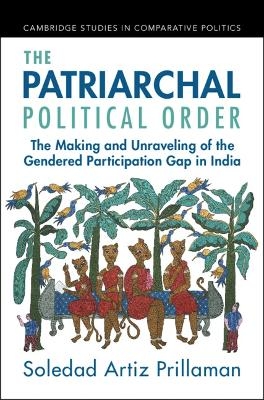
The Patriarchal Political Order
Cambridge University Press (Verlag)
978-1-009-35575-9 (ISBN)
Women across the Global South, and particularly in India, turn out to vote on election days but are noticeably absent from politics year-round. Why? In The Patriarchal Political Order, Soledad Artiz Prillaman combines descriptive and causal analysis of qualitative and quantitative data from more than 9,000 women and men in India to expose how coercive power structures diminish political participation for women. Prillaman unpacks how dominant men, imbued with authority from patriarchal institutions and norms, benefit from institutionalizing the household as a unitary political actor. Women vote because it serves the interests of men but stay out of politics more generally because it threatens male authority. Yet, when women come together collectively to demand access to political spaces, they become a formidable foe to the patriarchal political order. Eye-opening and inspiring, this book serves to deepen our understanding of what it means to create an inclusive democracy for all.
Soledad Artiz Prillaman is an assistant professor of Political Science at Stanford University. She is also the faculty director of the Inclusive Democracy and Development Lab at Stanford. Prillaman specializes in comparative political economy, development, and gender, with a focus in South Asia.
Part I. The Puzzle of Women's Political Participation: 1. Introduction; 2. Patriarchy, inequality, and the political lives of rural Indian women; 3. A relational theory of women's political participation; Part II. The Patriarchal Political Order: 4. The patriarchal political household; 5. Political behavior under household cooperation; 6. The patriarchal political order – networks and the nature of political organization; Part III. The Unravelling; 7. The power of autonomy from the household and women's collective action; 8. Consciousness-raising as the ignition for collective action; Part IV. Consequences of Inclusion: 9. Women's mobilization across India and its portents; 10. Conclusion: political inclusion as a path to social change.
| Erscheinungsdatum | 03.10.2023 |
|---|---|
| Reihe/Serie | Cambridge Studies in Comparative Politics |
| Zusatzinfo | Worked examples or Exercises |
| Verlagsort | Cambridge |
| Sprache | englisch |
| Maße | 155 x 235 mm |
| Gewicht | 690 g |
| Themenwelt | Sozialwissenschaften ► Politik / Verwaltung ► Vergleichende Politikwissenschaften |
| Sozialwissenschaften ► Soziologie ► Spezielle Soziologien | |
| Wirtschaft ► Volkswirtschaftslehre ► Wirtschaftspolitik | |
| ISBN-10 | 1-009-35575-9 / 1009355759 |
| ISBN-13 | 978-1-009-35575-9 / 9781009355759 |
| Zustand | Neuware |
| Informationen gemäß Produktsicherheitsverordnung (GPSR) | |
| Haben Sie eine Frage zum Produkt? |
aus dem Bereich


